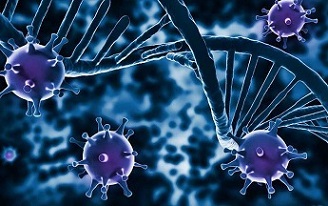Gene Expression Changes In COVID-19 Patients Impact Pathways Of Circadian Rhythm, Phosphatidylinositol Signaling, Cytokine Storm & Platelet Aggregation!
Thailand Medical News Team Aug 23, 2023 1 year, 7 months, 4 weeks, 16 hours, 37 minutes ago
COVID-19 News: The battle against the relentless SARS-CoV-2 pandemic has been marked by intense scientific pursuit. While strides have been made with vaccines, the intricacies of COVID-19's impact continue to unfold. A groundbreaking study conducted at the Massachusetts College of Pharmacy & Health Sciences (MCPHS University) has illuminated the gene expression changes in COVID-19 patients, uncovering a web of connections with pathways central to circadian rhythm, phosphatidylinositol signaling, cytokine storms, and platelet aggregation. These findings herald a deeper understanding of the disease and open avenues for targeted interventions.
 A Lingering Threat Amid Progress
A Lingering Threat Amid Progress
As the world grapples with COVID-19's enduring challenges, the journey to eradicate this ruthless virus remains fraught with obstacles. Age and pre-existing conditions influence disease severity, and even though vaccines have offered hope, the battle is far from over. Latest
COVID-19 News updates show that various new SARS-CoV-2 sub-lineages are emerging that are more transmissible, immune evasive and even exhibiting changes in pathogenesis with implications for long term health issues. The current focus has shifted to understanding the intricate gene expression dynamics underlying the disease's various manifestations.
Gene Expression: A Key to Unlocking COVID-19 Mysteries
MCPHS University embarked on an ambitious mission to unravel the enigma of COVID-19 by analyzing gene expression profiles of patients with distinct characteristics. The research dissected datasets from the Gene Expression Omnibus (GEO), including GSE152418, GSE171110, and GSE157103, to tease out the genes and pathways associated with the virus's impact on different patient groups.
Decoding the Complex Genetic Interplay
The study meticulously examined the differentially expressed genes (DEGs) between COVID-19 patients and control individuals, severe and moderate cases, younger and older patients, and those on mechanical ventilators versus those who weren't. The analyses unearthed remarkable insights into the underlying mechanisms driving the disease's trajectory.
Eyes on the Immune Response and Beyond
Intriguingly, the study's findings unveiled the modulation of pathways integral to immune response, inflammation, cancer, circadian rhythms, and phosphatidylinositol signaling. Key players governing circadian rhythms and PI signaling exhibited downregulation, contrasting with the upregulation of genes and proteins tied to inflammation and cancer. A pivotal gene, FLT3, responsible for heightened cytokine production, was linked to VAV1 and TET proteins, central to cytokine generation.
Aging Amplifies the Impact
Age emerged as a critical factor, with the gene expression landscape diverging between younger and older COVID-19 patients. Beyond inflammation and immune pathways, the genetic impact extended to platelet activation, signaling, aggregation, and extracellular matrix or
ganization, revealing an intricate dance between age and gene expression in shaping disease outcomes.
Mechanical Ventilation Unveils New Pathways
The study's spotlight extended to patients requiring mechanical ventilation. Here, pathways like PD-1 signaling, TCR signaling, and CD3 and TCR zeta chain phosphorylation were brought into the fold. The intricate network of genes revealed the virus's strategic targeting of essential immunological pathways, shedding light on the battle within the body's defenses.
A Symphony of Insights
The research's implications reverberate throughout the realm of COVID-19 understanding. By deciphering the intricate genetic dance, researchers can discern potential intervention points for severe cases, tailoring treatment strategies based on patients' unique characteristics. The findings prompt a reconsideration of conventional treatment approaches, harnessing the newfound knowledge to fine-tune therapeutic avenues.
A Glimmer of Hope Amid the Storm
Amid the chaos of the COVID-19 pandemic, scientific progress stands as a beacon of hope. The study from MCPHS University unfurls a tapestry of gene expression dynamics, offering a unique perspective into the intricate pathways driving the disease's course. As the battle against SARS-CoV-2 continues, these insights hold the promise of steering us towards more effective treatments, inching us closer to a world free from the clutches of this relentless foe.
The study findings were published in the peer reviewed journal: Gene Reports.
https://www.sciencedirect.com/science/article/abs/pii/S2452014423000936
For the latest
COVID-19 News, keep on logging to Thailand Medical News.
